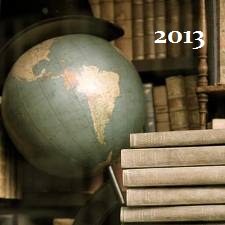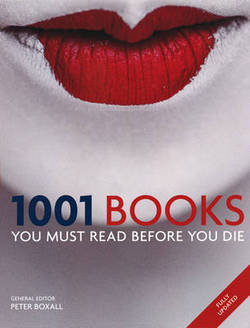 Well, I’m reading a lot, but I’m not doing a very good job of filling you in on what I’m reading. Work is winning in the battle for my time. So this is what I’ve been doing, other than reading The Grief of Others, the only book I’ve managed to review in ages. Don’t expect very thorough reviews…
Well, I’m reading a lot, but I’m not doing a very good job of filling you in on what I’m reading. Work is winning in the battle for my time. So this is what I’ve been doing, other than reading The Grief of Others, the only book I’ve managed to review in ages. Don’t expect very thorough reviews…
 The End of the Affair by Graham Greene
The End of the Affair by Graham Greene
My rating: 4 of 5 stars
“I became aware that our love was doomed; love had turned into a love affair with a beginning and an end. I could name the very moment when it had begun, and one day I knew I should be able to name the final hour. When she left the house I couldn’t settle to work. I would reconstruct what we had said to each other; I would fan myself into anger or remorse. And all the time I knew I was forcing the pace. I was pushing, pushing the only thing I loved out of my life. As long as I could make believe that love lasted I was happy; I think I was even good to live with, and so love did last. But if love had to die, I wanted it to die quickly. It was as though our love were a small creature caught in a trap and bleeding to death; I had to shut my eyes and wring its neck.”
This novel initially appears to be about the usual love triangle between husband, wife, and other man, but soon it becomes about something profoundly deeper. While it certainly grapples with very human tendencies in relationships, as is clear in the quotation above, it is also about belief and unbelief and the struggle over obligations to God. It continues to be very clear to me why people call Graham Greene a Catholic novelist. I actually feel almost guilty reading him at this point, because I feel like I am cheating on the Jewish tradition that I have converted to when I read his work. I don’t know what it feels like to read Greene if you’ve never been Catholic, but for me, reading him taps into a deep spiritual vein from my former tradition.
Related to this, I wonder if Greene’s novels feel heavy handed if you are not a fairly spiritually oriented person. So much of the richness of his novels is in the religious struggles of his characters. What does this feel like if you read it as an atheist? I’d be interested to hear what others have to say on this.
 Pereira Maintains by Antonio Tabucchi
Pereira Maintains by Antonio Tabucchi
My rating: 4 of 5 stars
“Pereira maintains he met him one summer’s day. A fine fresh sunny summer’s day and Lisbon was sparkling. It would seem that Pereira was in his office biting his pen, the editor-in-chief was away on holiday while he himself was saddled with getting together the culture page, because the Lisboa was now to have a culture page and he had been given the job. But he, Pereira, was meditating on death. On that beauteous summer day, with the sun beaming away and the sea breeze off the Atlantic kissing the treetops, and a city glittering, literally glittering beneath his window, and a sky of such blue as never was seen, Pereira maintains, and of a clarity almost painful to the eyes, he started to think about death. Why so? Pereira cannot presume to say.”
In this fascinating little book, a pudgy widower and culture page editor is drawn into a political awakening by a young student he hires because of a thesis about death, a subject which turns out to be of much more concern to the editor than to the student himself. Set in Portugal at the time of the Spanish Civil War, it evokes the climate of the era and the degree of suspicion in the air in Lisbon.
 The Story of Lucy Gault by William Trevor
The Story of Lucy Gault by William Trevor
My rating: 4 of 5 stars
“As the surface of the seashore rocks were pitted by by the waves and gathered limpets that further disguised what lay beneath, so time made truth of what appeared to be. The days that passed, in becoming weeks, still did not disturb the surface an assumption had created. The weather of a beautiful summer continued with neither sign nor hint that credence had been misplaced. The single sandal found among the rocks became a sodden image of death; and as the keening on the pier at Kilauran traditionally marked distress brought by the sea, so did silence at Lahardane.”
This is a novel in which small events have devastating consequences. The tale is set in motion by an unsuccessful attempt by Irish youths to set fire to the home of a wealthy landowner and his English wife. Captain Gault, the landowner, accidentally shoots one of the boys in the shoulder when trying to scare them off. After his overtures to the family of the injured boy are rejected, Evert and his wife decide it isn’t say to stay in Ireland, so they prepare to close the house and go abroad. Their young daughter Lucy, not wanting to leave, runs off to be with the one of the staff who has been let go, but twists her ankle in the woods on the way. A dog in the area has stolen items of her clothes in the past when she has been swimming, and has buried them in rocks near the edge of the sea. When Lucy doesn’t come back from playing and her father finds the clothes, she is assumed to have drowned. Eventually the bereft parents go abroad, haunted by grief, and only once they have left, is Lucy discovered in a fallen down vagrant’s hut in the woods, almost dead from starvation.
The tale follows Lucy, her parents, and the boy who was shot in the shoulder as their various destinies play out. It is a story about loss, faith, loyalty, the prison of preconceptions, guilt, forgiveness, and gratitude. It is a beautiful and haunting novel.
 Execution Dock by Anne Perry
Execution Dock by Anne Perry
My rating: 3 of 5 stars
Fun, quick read. Monk is back on the police force, but this time the River Police working the Thames.
 Oryx and Crake by Margaret Atwood
Oryx and Crake by Margaret Atwood
My rating: 4 of 5 stars
Selected quotes:
“All it takes,” said Crake, “is the elimination of one generation. One generation of anything. Beetles, trees, microbes, scientists, speakers of French, whatever. Break the link in time between one generation and the next, and it’s game over forever.”
“When they’re gone out of his head, these words, they’ll be gone, everywhere, forever. As if they had never been.”
“He doesn’t know which is worse, a past he can’t regain or a present that will destroy him if he looks at it too clearly. Then there’s the future. Sheer vertigo.”
Oryx and Crake is the first book of the MaddAddam Trilogy. It is a funny, dark, marvelous introduction to a dystopian world. When brilliant geneticists have invented things like pigs that grow bunches of transplantable organs and weird animal hybrids like a skunk/raccoon mis or a vicious dog/wolverine mix, when the profit potential from curing stuff has petered out cause folks can cure every current disease, what happens next? Margaret Atwood gives us the outcome in this novel, where the apocalypse isn’t an explosion, but something much more insidious.
Snowman is wandering what’s left of New England, looking for resources, hiding from creepy hybrid animals, creating a belief system for s strange group of humanoids, engineered by his boyhood friend Crake. We learn of the world before the crisis through his memories of the somewhat bizarre culture in which he was raised.
I can’t wait to read the rest of the series.
 The Eye in the Door by Pat Barker
The Eye in the Door by Pat Barker
My rating: 4 of 5 stars
A wonderful continuation of the exploration of war, psychological functioning, and sexualtiy in the Britain of the early 20th century that began with Regeneration. Pat Barker is a brilliant author, and she has chosen powerful characters from British history to work with. Regeneration centered directly on PTSD, or shell-shock as it was called at the time, the ways of treating it, and the moral dilemma of doctors making people well so that they could return to the very war conditions that had made them ill. This novel focuses more on both the complex moral relationship between soldiers and pacifists in wartime and on the situation of gay men in Britain during this era. This is the book of the trilogy which has received the least critical acclaim, but it is still a very strong book. It continues the very powerful therapeutic relationship between Dr. William Rivers and Billy Prior, which brings up powerful issues and questions in both men as it unfolds.
 The Ghost Road by Pat Barker
The Ghost Road by Pat Barker
My rating: 4 of 5 stars
“We are Craiglockhart’s success stories. Look at us. We don’t remember, we don’t feel, we don’t think – at least beyond the confines of what’s needed to do the job. By any proper civilized standard (but what does that mean now?) we are objects of horror. But our nerves are completely steady. And we are still alive.”
“Ghosts everywhere. Even the living were only ghosts in the making. You learned to ration your commitment to them. This moment in this tent already had the quality of remembered experience. Or perhaps he was simply getting old. But then, after all, in trench time he was old. A generation lasted six months, less than that on the Somme, barely twelve weeks.”
I truly loved this series. This novel is a powerful blend of letters about life at the front in France during WWI, scenes of a psychiatric and medical hospital in London where the physical and mentally wounded are being treated, and memories of Dr. William Rivers’ time with a tribe of headhunters in Melanesia. It is beautiful, thought-provoking, and heart-rending.
 The Sorrows of Young Werther by Johann Wolfgang von Goethe
The Sorrows of Young Werther by Johann Wolfgang von Goethe
My rating: 1 of 5 stars
Wow, I hated this book. Apparently it was Harry Potter like in its ability to create a fan base at the time. People dressed like Werther, imitated Werther, even committed suicide like Werther. Napoleon claimed to have carried it into battle in his jacket pocket. Well, fortunately, I guess, I don’t feel any desire to jump on that bandwagon. Guess I’m not into German Romanticism. My main reaction as I listened to this one was “OH MY GOD, SHUT UP!!!!” And even worse, “get on with killing yourself, already, you insufferable drama queen!”
My main association was to the younger sister in Sense and Sensibility who is a little too into the drama of love, at the expense of common sense and her own well-being. This novel is a huge argument in favor of the sensibility side of that little pairing.
At the beginning of the book, Werther was somewhat less annoying, because while extravagant, he was not yet severely depressed. He spoke of the beauties of nature and waxed rhapsodic about the wisdom of children. I felt like I was getting a bunch of illustrative examples from a humanities course of the themes of German romanticism thrown at me rapid fire. But once Werther got depressed over the marriage of the woman he had been WARNED BEFORE HE EVEN MET HER NOT TO FALL FOR BECAUSE SHE WAS ENGAGED (no, I’m not annoyed at this twit of a character at all…), he became completely unbearable.
I feel a little less guilty for hating this novel because Johann Wolfgang von Goethe wasn’t real into this one in retrospect either. He also soured on Romanticism by late in his life. He didn’t get why everyone was so nuts for Werther, because he felt his portrayal had been pretty critical. I’m hoping I will like his other works better based on this.
I’m in the middle of two fun ones now: Trapeze, a novel about a woman spying in France in WWII, the The Girl Who Kicked the Hornet’s Nest. Reviews to follow!


 And then again…there is boundless delight in the possession of a young, barely unfolded soul! It is like a flower whose best fragrance emanates to meet the first ray of the sun. It should be plucked that very minute and after inhaling one’s fill of it, one should throw it away on the road: perchance someone will pick it up! I feel in myself this insatiable avidity, which engulfs everything met on the way. I look upon the sufferings and joys of others only in relation to myself as on the food sustaining the strength of my soul. I am no longer capable myself of frenzy under the influence of passion: ambition with me has been suppressed by circumstances, but it has manifested itself in another form, since ambition is nothing else than thirst for power, and my main pleasure–which is to subjugate to my will all that surrounds me, and to excite the emotions of love, devotion, and fear in relation to me–is it not the main sign and greatest triumph of power? To be to somebody the cause of sufferings and joys without having any positive right to it–is this not the sweetest possible nourishment for our pride? And what is happiness? Sated pride. If I considered myself to be better and more powerful than anyone in the world, I would be happy; if everybody loved me, I would find in myself infinite sources of love. Evil begets evil: the first ache gives us an idea of the pleasure of tormenting another . The idea of evil cannot enter a person’s head without his wanting to apply it to reality: ideas are organic creations. Someone has said that their very birth endows them with a form, and this form is action; he in whose head more ideas have been born is more active than others. This is why a genius chained to an office desk must dies or go mad, exactly as a powerfully built man, whose life is sedentary and whose behavior is virtuous, dies of apoplexy.
And then again…there is boundless delight in the possession of a young, barely unfolded soul! It is like a flower whose best fragrance emanates to meet the first ray of the sun. It should be plucked that very minute and after inhaling one’s fill of it, one should throw it away on the road: perchance someone will pick it up! I feel in myself this insatiable avidity, which engulfs everything met on the way. I look upon the sufferings and joys of others only in relation to myself as on the food sustaining the strength of my soul. I am no longer capable myself of frenzy under the influence of passion: ambition with me has been suppressed by circumstances, but it has manifested itself in another form, since ambition is nothing else than thirst for power, and my main pleasure–which is to subjugate to my will all that surrounds me, and to excite the emotions of love, devotion, and fear in relation to me–is it not the main sign and greatest triumph of power? To be to somebody the cause of sufferings and joys without having any positive right to it–is this not the sweetest possible nourishment for our pride? And what is happiness? Sated pride. If I considered myself to be better and more powerful than anyone in the world, I would be happy; if everybody loved me, I would find in myself infinite sources of love. Evil begets evil: the first ache gives us an idea of the pleasure of tormenting another . The idea of evil cannot enter a person’s head without his wanting to apply it to reality: ideas are organic creations. Someone has said that their very birth endows them with a form, and this form is action; he in whose head more ideas have been born is more active than others. This is why a genius chained to an office desk must dies or go mad, exactly as a powerfully built man, whose life is sedentary and whose behavior is virtuous, dies of apoplexy.











